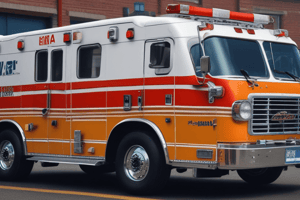Podcast
Questions and Answers
What is the study of drugs' properties and effects on the body called?
What is the study of drugs' properties and effects on the body called?
- Pharmacology (correct)
- Pathology
- Physiology
- Anatomy
Which term refers to the amount of medication given to achieve the therapeutic effect?
Which term refers to the amount of medication given to achieve the therapeutic effect?
- Dosage
- Contraindication
- Dose (correct)
- Prescription
What are undesirable but low-risk effects of medications called?
What are undesirable but low-risk effects of medications called?
- Adverse effects
- Unintended effects (correct)
- Trade names
- Contraindications
Where can medications be derived from according to the text?
Where can medications be derived from according to the text?
Which government agency regulates drug safety, advertising, and distribution in the United States?
Which government agency regulates drug safety, advertising, and distribution in the United States?
What process do new drugs typically undergo before approval for market distribution?
What process do new drugs typically undergo before approval for market distribution?
Flashcards
Pharmacology
Pharmacology
The study of how drugs interact with the body, including their properties and effects.
Dose
Dose
The amount of medication given to achieve the desired therapeutic effect.
Unintended effects
Unintended effects
Side effects of medication that are undesirable but usually low-risk.
Drug sources
Drug sources
Signup and view all the flashcards
FDA
FDA
Signup and view all the flashcards
Drug approval process
Drug approval process
Signup and view all the flashcards
Study Notes
- Advanced EMTs can administer medications to patients and help with self-administration.
- Pharmacology is the study of drugs' properties and effects on the body.
- Medications are chemical substances used for treatment, prevention, or pain relief.
- Dose is the amount of medication given, aiming for the therapeutic effect.
- Unintended effects are undesirable but low-risk, while adverse effects can harm the patient.
- Indications are when to use a medication, contraindications are when not to.
- Drugs are derived from animals, plants, minerals, and synthetic compounds.
- Medications have trade names (brand), generic names, chemical names, and official names.
- Prescription meds need a doctor's order, while OTC meds don't.
- Laws regulate drug manufacturing to ensure safety, accurate labeling, and standardized doses.
- Government agencies like FDA, DEA, and FTC regulate drug safety, advertising, and distribution.
- New drugs undergo animal studies and clinical trials before approval for market distribution.
Studying That Suits You
Use AI to generate personalized quizzes and flashcards to suit your learning preferences.




